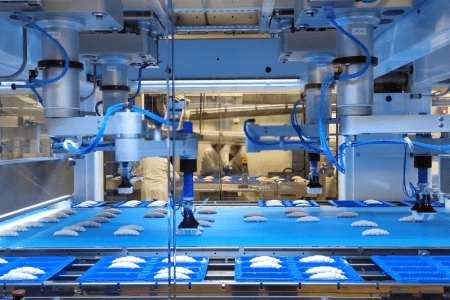Mühlenchemie’s enzyme solutions are a tried-and-tested way of resolving difficulties millers and bakers face in processing flour
High-quality baked goods need high-quality flours.
The quality of baked goods is inseparably linked with the quality of flour. However, wheat with the desired processing properties is not always available or affordable. To meet nevertheless the variable requirements of the markets, tailor-made flour treatment is a key issue in the milling and baking industry. Customised enzyme solutions are the most efficient and economical tool to optimise the baking properties of flour and to cope with the imponderables of the supply chains.
Mixtures of different origins impair wheat standardisation
Millers all over the globe are confronted with a host of various challenges. The most difficult one is the purchase of raw materials. Firstly, being a natural product, grain is subject to considerable fluctuations in quality; these may be caused by climatic factors such as heat, precipitation, and frost or by fertilizers and irrigation or bug damage. Secondly, the purchase of wheat is aggravated by volatile prices and restricted availability, especially in wheat importing countries. For instance, a miller in Algeria may have to deal with French wheat one day, and on the next with wheat lots from Canada, or other wheat exporting areas. Despite this difficult situation, the flour must have consistent and suitable properties to produce bread, baguettes, rolls, wafers, crackers or e.g. pasta.
Innovative solutions for flour enhancement
The use of enzymes and additives is a tried- and-tested way of solving such difficulties. Mühlenchemie is a pioneer in the standardisation and optimisation of flour and offers a multitude of innovative solutions enabling the industry to enhance even problematical flours. Among others, the range of improvers includes solutions for volume yield, gluten enhancement, fresh keeping and softness, or Falling Number (FN) correction.
Best results with precisely adjusted enzyme systems
The focus lies on the development of complex enzyme systems, which are much more effective than single ingredients. Over years of applied research, MC’s R&D team has outlined that many single enzymes alone such as amylases, glucoamylases, proteases, hemicellulases and lipases, with their different specific effects and strengths, do not achieve the best possible results. In the quality standardisation of flour, especially, what matters most is the interaction of various enzymes and other active ingredients. MC’s enzyme systems make use of the synergistic potential of the individual substances and combine them to create efficient flour improvers.
Only perfectly adjusted flour ensures a trouble-free baking process and high-quality baked products
Flour treatment is an essential tool for optimising flour properties. By enhancing the enzymatic components with other baking-active ingredients like oxidizing agents, vital gluten or hydrocolloids, flour properties can be perfected to the last detail. Whether it is a question of water absorption, fermentation stability, volume, oven rise, browning, softness or shelf life – flour, which is perfectly adjusted to the baking process, ensures a smooth and trouble-free processability and improves the quality of the baked goods significantly.
In addition to quality and processing aspects, downstream manufacturers also profit in economic terms. Above all, reliable processing properties reduce the number of interruptions. In addition, improved properties such as a higher water absorption capacity or the optimisation of the flour’s lipids and starch, which allow the reduction or elimination of emulsifiers, increase yield and profitability.
Read the full feature in our free to download magazine.
Never miss a story… Follow us on:
![]() International Bakery
International Bakery
![]() @int_bakery
@int_bakery
![]() @Bakeryint
@Bakeryint
Media contact
Caitlin Gittins
Editor, International Bakery
Tel: +44 (0) 1622 823 920
Email: editor@in-bakery.com






